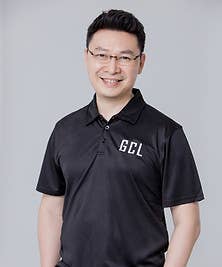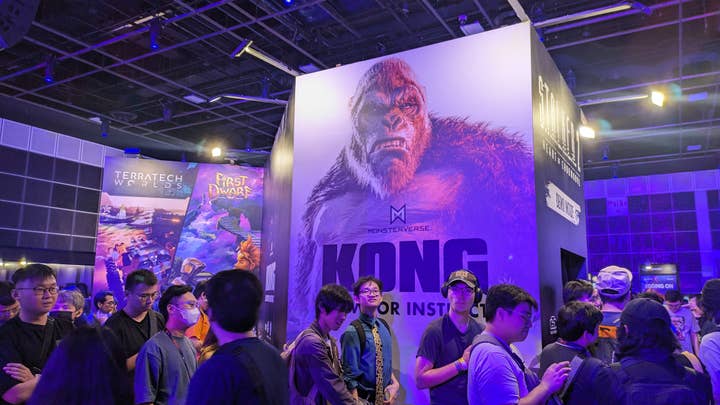From distributor to developer: GCL's ambition to create Asian IPs for the world
Keith Liu on the Singapore-based conglomerate's ambitions to evolve from distributor and publisher to developer, and the specificities of the Southeast Asian markets
While the name might not sound as familiar in the west, GCL is one of the biggest digital entertainment companies in Asia, publishing titles like Black Myth Wukong, Stalker 2, and Atomic Heart on the continent, and distributing titles from some of the biggest companies in games including Take-Two, CD Projekt Red, Sega, and Warner Bros.
"GCL is a group of six brands that cover the spectrum of gaming in Asia," chief marketing officer and head of publishing Keith Liu tells GamesIndustry.biz when we meet at Gamescom Asia. "We're one of the larger gaming companies in this region, from publishing our games to distribution, to having an influencer marketing agency and a digital games retail brand called 2Game."
The firm also does accessories and digital vault technology, and is headquartered in Singapore, with teams in Hong Kong, Taiwan, China. It is also nurturing strong relationships in Japan and Korea as well.
GCL's publishing branch is called 4Divinity and it often assumes the role of co-publisher for AAA titles across Asian territories. For instance, it co-published the recently released Stalker 2 in Southeast Asia, Hong Kong, and Taiwan, while Plaion and Sega handled Europe and Japan, respectively.
For a title like JDM: Japanese Drift Master, 4Divinity acted as co-publisher for PC only in Asia Pacific, which includes Japan and Korea. Next year, it'll work alongside My Games' new publishing branch, Knights Peak, to release Mandragora in Asia. It handled similar responsibilities for Kong: Survivor Instinct, Atomic Heart, Daymare, and more.
"We've got all these titles, many of them we bring in from the West to the Asian market, but increasingly we are also looking at bringing titles from Asia to the rest of the world," Liu says.
"Asia is quite a fragmented market," he continues when we ask why developers might need the help of 4Divinity. "Aside from the ratings, which you've got a few of, there are also differences in languages, differences in what [Asian gamers] really like to play, [and] how to reach out to them, in terms of social media platforms. Many of these countries, when it comes to these things, they're more localised. So because of that, it's kind of complex to navigate within Asia and, a lot of the time, if a Western publisher wants to come to Asia, they might have to end up working with a few different partners for different territories.

"What we've done is we've helped to build out that network, and also the connections [and] skillsets to be able to address Asia, not as a whole [because] one size does not fit all, but being able to do a lot in these territories with a more local approach. I think that's what they appreciate about what we can do, and for them we're just one neck to choke, basically," he laughs.
"We're the one partner that can help them to access China, Japan, Korea, Southeast Asia, which are very, very different beasts in general. We started actually with our distribution network, Epicsoft Asia. It's a 16-year-old [business]."
The first game that Epicsoft Asia distributed was Grand Theft Auto 4, and it's continued to work with Take-Two since then for GTA titles and Red Dead Redemption. It also worked with CD Projekt Red and distributed Cyberpunk 2077 in 2020, and also distributes all of Sega Japan's titles for Southeast Asia, Hong Kong, and "into China a little bit," Liu says. For Warner Bros, it worked on Hogwarts Legacy, Mortal Kombat, and more.
"These brands were trusting us all these years and we've had these relationships for a very long time so it's not a one-off thing. And it also means that they're happy with what we do. So what we've done is we've extended that into the publishing business as well, and extended that into Japan, Korea, and that sort of thing."
And that's only the first step for GCL, as the company announced last year it was getting ready to go public on Nasdaq in order to fulfil its game development ambitions. Liu tells us it'll be through a De-SPAC route rather than a traditional IPO and that the journey "isn't as fast as [they] would have wanted to" but that there will be more to announce soon.
"We [are] still looking to tap [into] the capital market for additional funding and investment in order to grow GCL into a much larger conglomerate so that we can start making games. So we do have plans to develop our own titles, and we have very high ambitions and aspirations to not just create any game; we want to make it an impactful and significant one that people will remember and talk about.
"So obviously it's gonna be a bit on the higher budget side [and] we're still working out those plans, but definitely game development is something that's on our trajectory. It has to because, at the end of the day, you want to be a company that creates IP and owns IP."
"Game development is something that's on our trajectory... At the end of the day, you want to be a company that creates IP and owns IP"
GCL aims to create IPs that are "more Asian," Liu adds, inspired among others by the success of Black Myth: Wukong.
"We're trying to bring some of this Asian culture to the rest of the world. I think Black Myth: Wukong, just as an example, [has] given big lessons for the whole gaming industry everywhere.
"We're taking lessons from that, and we feel that the release of this title, the story behind [it], and how successful it's been and what they've been able to achieve, is a really positive thing for the whole industry, that's really been beset by bad news all around, right? All the layoffs, and all the expansion pre-COVID and then all the implosions post-COVID... It's just been quite unfortunate. And we feel that we are in a slightly better place... The markets all still want good content. We just need to give them good content. Don't make it too complicated, right? Just make games that are fun. Let's go back to that, because people just want to have fun."
This echoes sentiments expressed by Shawn Layden during the fireside chat that opened Gamescom Asia. Liu says he's in agreement with the former PlayStation exec, adding that a balance has to be found where you still can create good content that the world appreciates without breaking the bank.
"And that's where I would say the real test and the real challenge are. But we've always had these challenges when making games, it's just that it's gotten so expensive that, if you fail, what happens after is a lot harder to get out of.
"So for us, it's really important to really understand the fundamentals of what the market is really looking for. And the market has changed as well. But offering something that's fresh, and not really succumbing to so-called trends... Gamers always want fresh experiences. So if they're happy with something that they've already played, and that's done really well, that doesn't mean that if you do something similar, it will do as well."
"We're trying to bring some of this Asian culture to the rest of the world. I think Black Myth: Wukong, just as an example, [has] given big lessons for the whole gaming industry everywhere"
The market is in constant evolution, and what works in certain parts of the world might not work elsewhere. That also applies to the formats people are after, Liu tells us as we pivot the conversation to the Southeast Asian market and what players buy here.
"Retail remains a big part of the gaming landscape, in Southeast Asia, Hong Kong, Taiwan, and China as well," Liu says. "When it comes to console titles, the markets differ from PC and I would say that if you compare PC and console markets here in Asia, the PC market, thanks to China, absolutely dominates. So, consoles themselves haven't really gotten like a massive headway into the China market, for historical and cultural reasons. You see the traditional markets like Japan, Taiwan, and to some extent Korea, still dominating the console space. Of course, when it comes to Korea, mobile has absolutely taken over as well, and PC is growing really, really fast also. So in that sense, the overall console market is a lot smaller vis-a-vis the overall gaming market here in Asia.
"So when you look at it from that perspective, and you look at digital [versus] physical, digital games still dominate because of PC, and Steam primarily, and also because of mobile."
However, when it comes to console, physical sales still predominate for a couple of reasons, Liu explains.
"With day one launch titles, the physical SKUs still have a very big impact on the market"
"Firstly, let's just talk about Switch: Nintendo's eShop is only officially available in Japan, Hong Kong, and Korea. It's not available in other markets in Southeast Asia. Sony's a lot better with PlayStation. They've got seven PSN stores in the countries, so you've got Malaysia, Singapore, Thailand, Indonesia, and then Taiwan, Hong Kong, Korea.
"[But] digital has absolutely grown, especially in the last couple of years. I think consumers look to digital for titles that have been around for a while because they tend to see discounted prices for those titles. So pricing makes a difference, right? But with what we call day one launch titles, the physical SKUs still have a very big impact on the market. Especially for those who want to play the latest games first."
He continues: "The other reason is that it's quite a nice second-hand market in many parts of Asia. So after you play it, you go back to your games retailer and trade it in for something else."
We mention that the second-hand market has plummeted in the UK for instance, where it barely exists anymore, similarly to brick-and-mortar game shops in general.
"There are also online platforms where people can get together and do these exchanges or sell [games] off to someone in their town, and then go buy other pre-owned titles from someone else – that's still happening," Liu continues.
"And then I'd say if you look at retail, Japan is still one of the biggest markets for physical [sales]. [It] continues to be. In Korea, that's dropped off – I think now physical is about 30%, from my understanding. But in Southeast Asia, it's still at least 50% to 60% of the market. So in that sense there's still half, or more than half, of the market. For day one, definitely higher. For back catalogue, that's gone down. It's all about pricing, it's all about affordability."

